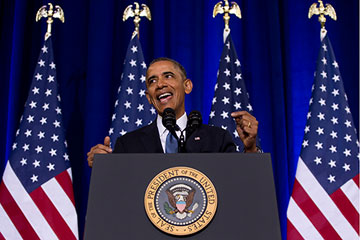The Case for Snooping
< < Go Back
by Fareed Zakaria,
Obama’s liberal critics say his speech on the NSA didn’t go far enough. Why they’re wrong
It’s not always true that if you’re under attack from both sides of the political spectrum, you’re probably doing the right thing. The smart or moral course is sometimes resolutely partisan. But watching President Obama take flak from the left and the right for his speech on intelligence reform, I believe he’s striking a difficult balance on a crucial topic.
The speech annoyed liberals and conservatives suspicious of government overreach, but reaction from the left has been more anguished. Many voices have begun arguing that Edward Snowden’s revelations show that U.S. intelligence operations have run amok and are illegal and unconstitutional and that Snowden deserves to be pardoned and treated like a hero. The factual basis for every one of these claims is weak. … Obama conceded too much when he promised not to eavesdrop on a host of them. Foreign governments will certainly not return the favor and stop what is often a relentless effort to spy on America’s top officials and CEOs.
There is a gaping hole in the left’s understanding of U.S. intelligence work. The U.S.–its government, businesses and people–is under massive, sustained surveillance from and infiltration by criminals, terrorists and foreign governments. The Chairman of the Joint Chiefs of Staff pointed out recently that since 2011, cyberattacks on America’s critical infrastructure–chemical, electrical, water and transport systems–have risen seventeenfold. The National Nuclear Security Administration, which is responsible for the country’s nuclear power plants, reported in 2012 that it faces 10 million cyberattacks every day–that’s 3.65 billion in one year. Every major bank and corporation, from Bank of America to Goldman Sachs to the New York Times, faces almost continuous efforts from abroad to penetrate its networks, mine its data, disrupt its procedures and steal its secrets. The effects can range from disruption of transactions to systemic damage that feels more like a military invasion.
We all live, bank, work and play in a new parallel world of computer identities, data and transactions. But we do not seem to realize that this enormous freedom of activity in the cyberworld, as in the real world, has to be defended.
In “Federalist No. 51,” father of the American Constitution James Madison wrote (along with Alexander Hamilton) that in setting up a government, “the great difficulty lies in this: you must first enable the government to control the governed; and in the next place oblige it to control itself.” That is the balance we have to strike, in cyberspace as anywhere else.
More From TIME Magazine (subscription required):




